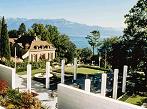 |
Back to the Data Model
The Area being Modelled is :-
The Olympic Games
A) The Question was ...
Subject: The Olympic Games
Question:
Events
The Olympic Games consists of a number of separate events, e.g., marathon, 100m sprint, judo, canoeing, etc.
The name of each event is unique. Some events are split into men's and women's event and these are recorded as two separate events,
for example, the men's 200m hurdles is different from the women's 200m hurdles and these are different again from the 200m sprint or any other sprint or hurdle events.
Each event belongs to a category, e.g. athletics, aquatics, cycling or equestrian.
Venues
Each event will be held at a number of venues over a two-week period.
The information required is the name, address, telephone number, curator, capacity and facilities (e.g., running track, high-jump, floodlights, etc).
Competitors
Each Competitor can complete in a number of events.
Competitors are given a unique identifier and this is recorded along with their name, address, date of birth, age, weight, height, nationality, gender and what events they have entered.
Team events will be looked at later and are not a requirement at this stage.
Heats
Once the number of competitors are known for each event, the organisers of the Games can decide on how many heats are needed.
Each heat is held at a specific venue at a particular date and time.
Each event has at least one heat, but some of the bigger events will have several heats.
When there is more than one heat, they are organised into rounds, e.g., first round,
second round, quarter-final, semi-final and final.
Competitors for an event are assigned to a specific first-round heat and the winners of each heat
are assigned to a heat in the next round.
The Database should record the position of each competitor in the heat.
If there is only one heat, the round is automatically called the final.
The winner of the final round wins the gold medal, second the silver and third the bronze.
Appendix One shows an example results sheet.
For publicity purposes, all the heats necessary for an event are scheduled in advance, even
though heats in later rounds have no allocated competitors at the time of scheduling.
Note, ticket sales for the heats have been outsourced to external contractors and is outside
the scope of this Database.
Officials
Events and heats have officials assigned to them.
Each heat at an event may have several types of official, e.g., starter, timekeeper, judge, and
several numbers of each type.
For example, a boxing match requires three judges and one referee, whilst a 10,000m race requires
one starter and ten timekeepers.
These requirements are recorded for each event and are the same for each heat of an event.
Each official has a unique identifier and the information recorded includes: name, address, date of
birth, age, nationality, gender and qualifications held.
One official may have several qualifications that cover different roles and different events.
For example, an official may have three qualifications: starter for 100m sprint, timekeeper for
100m sprint and timekeeper for the marathon.
Officials may only officiate at an event and in a role for which they are qualified.
A pool of officials is assigned to each event.
An official can be assigned to many events.
One of the assigned officials is nominated as being in overall charge of the event, though an
official can not be in charge of more than one event.
After the competitors in the heats are determined, the officials are assigned to that heat.
No official can fulfil more than one role in any heat, though they can fill different roles at
different heats of one event, e.g., a timekeeper in one heat and a starter in another.
One of the officials assigned to the heat is nominated to be in overall charge of the heat and
can be in charge of more than one heat.
Additionally, an official can not be assigned to a heat if they are the same nationality as any
of the competitors in that heat.
CAN YOU DRAW AN ERD FOR THIS THANK YOU IN ADVANCE
B. Barry says the Things of Interest are :-
1. Competitors
2. Sports
3. Others to be determined
C. The Business Rules are as follows :-
1. To be determined.
© DataBase Answers Ltd. 2011
|
|

